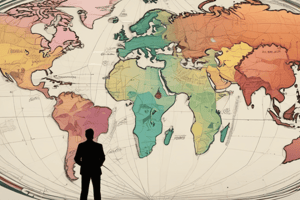Podcast
Questions and Answers
What is the primary goal of international marketing beyond a brand's domestic audience?
What is the primary goal of international marketing beyond a brand's domestic audience?
to increase brand awareness, develop a global audience, and grow business
What is the key difference between domestic marketing and international marketing?
What is the key difference between domestic marketing and international marketing?
domestic marketing occurs within a single country, whereas international marketing involves marketing products or services beyond a brand's domestic audience
What is the characteristic of a domestic business?
What is the characteristic of a domestic business?
it involves commercial exchanges that are only done within a single country
What is a key difference between domestic business and international business?
What is a key difference between domestic business and international business?
What is a key benefit of international marketing?
What is a key benefit of international marketing?
How do uncontrollable variables differ between domestic and international marketing?
How do uncontrollable variables differ between domestic and international marketing?
What are some of the risks and challenges involved in international marketing?
What are some of the risks and challenges involved in international marketing?
Why do governments impose tariffs on imported goods?
Why do governments impose tariffs on imported goods?
What is a consequence of tariffs on domestic consumers?
What is a consequence of tariffs on domestic consumers?
What is a potential consequence of tariffs on domestic industries?
What is a potential consequence of tariffs on domestic industries?
What is a global environmental force that can affect a firm's success in international marketing?
What is a global environmental force that can affect a firm's success in international marketing?
Why is broader competence required in international marketing?
Why is broader competence required in international marketing?
Study Notes
### International Marketing Goals
- Goal of international marketing: To expand a brand's reach beyond domestic audiences to achieve growth, profitability, and market share in global markets.
International Marketing vs. Domestic Marketing
- Key difference: International marketing operates across national boundaries, facing diverse markets and environments with unique cultural, economic, legal, and political landscapes.
Domestic Business Characteristics
- Operates within a single country's borders.
Domestic vs. International Business
- Key difference: International business expands its activities to multiple countries, encountering varied customs, regulations, and consumer behaviors.
Benefits of International Marketing
- Access to new markets and customer bases: Expanding a brand's reach to new audiences, increasing potential customers and revenue.
Uncontrollable Variables in Domestic vs. International Marketing
- Domestic marketing: Uncontrollable factors are typically confined to a single country's environment.
- International marketing: Uncontrollable variables expand significantly, encompassing diverse economic, political, legal, technological, cultural, and competitive factors across multiple countries.
Risks and Challenges of International Marketing
- Cultural differences: Adapting marketing strategies to diverse cultures and consumer preferences.
- Economic instability: Fluctuations in currency exchange rates, inflation, and economic growth affecting market stability.
- Political risks: Unforeseen events influencing business operations, like changes in regulations, trade policies, and political instability.
- Legal and regulatory differences: Navigating complex legal systems and differing regulations across countries.
- Competition: Entering established international markets with seasoned competitors.
Government Tariffs
- Purpose of tariffs: To protect domestic industries from foreign competition, raise revenue for the government, and influence trade balances.
Impact of Tariffs
- Domestic consumers: Increase prices of imported goods, reducing purchasing power and affordability.
- Domestic industries: Can provide temporary protection from foreign competition, potentially leading to complacency and reduced competitiveness.
Global Environmental Forces
- Technological advancements: Affect consumer preferences, product development, and marketing strategies in international markets.
Broader Competence in International Marketing
- Requirement: International marketers need a wider range of skills and knowledge to navigate complex global environments, understanding cultural nuances, economic factors, and political considerations.
Studying That Suits You
Use AI to generate personalized quizzes and flashcards to suit your learning preferences.
Description
Test your knowledge of international marketing, its goals, and how it differs from domestic marketing. Learn about the importance of cultural understanding in global marketing.




